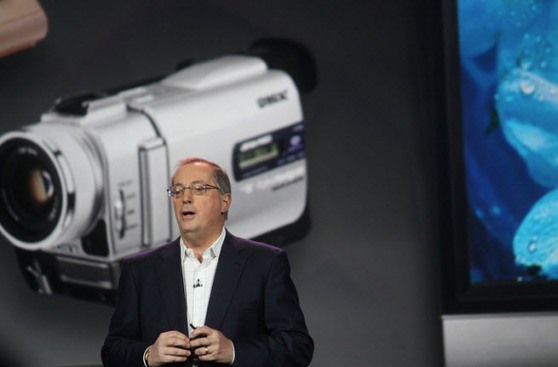Intel posted better-than-expected earnings for the fourth quarter ended Dec. 31, as PC sales weren’t as weak as forecast and server chip sales were strong.
[aditude-amp id="flyingcarpet" targeting='{"env":"staging","page_type":"article","post_id":606456,"post_type":"story","post_chan":"none","tags":null,"ai":false,"category":"none","all_categories":"business,enterprise,mobile,","session":"C"}']Analysts were expecting a consensus of 45 cents a share in the fourth quarter, down 30 percent from 64 cents a share a year ago. Those analysts expected revenue to fall 0.9 percent year-over-year to $13.76 billion for the quarter, compared to $13.89 billion a year ago. Intel posted earnings per share of 48 cents a share and revenues of $13.5 billion. So the earnings were better while revenues matched expectations.
Intel’s earnings are closely watched as a bellwether for the computer industry’s health as well as the overall tech industry. But like Microsoft, Intel is heavily weighted on chips for PCs, even as market demand shifts to smartphones and tablets. While those latter sectors are growing, PCs are believed to have fallen 5 percent in unit sales in the fourth quarter, according to market research firm Gartner. In after hours trading, Intel’s stock is up slightly 0.18 percent at $22.70 a share.
AI Weekly
The must-read newsletter for AI and Big Data industry written by Khari Johnson, Kyle Wiggers, and Seth Colaner.
Included with VentureBeat Insider and VentureBeat VIP memberships.
“The fourth quarter played out largely as expected as we continued to execute through a challenging environment,” said Intel president and chief executive Paul Otellini in a statement. “We made tremendous progress across the business in 2012 as we entered the market for smartphones and tablets, worked with our partners to reinvent the PC, and drove continued innovation and growth in the data center. As we enter 2013, our strong product pipeline has us well positioned to bring a new wave of Intel innovations across the spectrum of computing.”
Intel’s PC Client Group had revenue of $8.5 billion, down 1.5 percent from the previous quarter and down 6 percent from a year ago. Data Center Group revenue was $2.8 billion, up 7 percent sequentially and up 4 percent from a year ago. Other revenue was $1 billion, down 14 percent sequentially and down 7 percent from a year ago. Research and development and general sales and marketing spending was $4.6 billion, in line with the expectation of $4.5 billion. Gross margin percentage was 58 percent, 1 percentage point above the expectation of 57 percent.
“This is a good sign that didn’t slide backward in a very challenging market,” said Patrick Moorhead, an analyst at Moor Insights & Strategy. “Enterprise made up for most of the shortfall of PCs. Intel had a good quarter.”
In the first quarter, Intel predicts revenue of $12.7 billion, 58 percent gross margins, and R&D and MG&A spending of $4.6 billion.
For the full year, Intel’s PC Client Group revenue was $34.3 billion, down 3 percent. Data Center Group revenue was $10.7 billion, up 6 percent. Other revenue was $4.4 billion, down 13 percent.
For the full year, Intel expects low single-digit revenue increases. Gross margin percentage is expected to be 60 percent, plus or minus a few points. R&D and MG&A is expected to be $18.9 billion, plus or minus $200 million. Capita spending for 2013 is expected to be $13 billion, plus or minus $500 million.
[aditude-amp id="medium1" targeting='{"env":"staging","page_type":"article","post_id":606456,"post_type":"story","post_chan":"none","tags":null,"ai":false,"category":"none","all_categories":"business,enterprise,mobile,","session":"C"}']
Intel is shifting to meet mobile device demand. It has created laptop chips that dissipate as little as 7 watts, and its code-named Haswell processor coming mid-year is expected to be even better at power consumption. At the Consumer Electronics Show in Las Vegas, Intel said it was working with seven major vendors of smartphones who have launched Intel-based smartphones in 25 countries. But the revenue from those deals is a drop in the bucket compared to the revenues Intel gets from the PC chip business.
Having looked at designs in the works, Otellini said, “I’m genuinely excited about the new form factors.”
In the past four quarters, Intel’s revenue has been mixed. It fell 5.5 percent in the third quarter, rose 3.6 percent in the second quarter, was flat at 0.5 percent in the first quarter and soared 21.2 percent in the fourth quarter a year ago. Net income fell in each of the last three quarters. In third quarter, net income fell 14.3 percent from the year earlier. Second quarter net income was down 4.3 percent, and first quarter earnings were down 13.4 percent.
VentureBeat's mission is to be a digital town square for technical decision-makers to gain knowledge about transformative enterprise technology and transact. Learn More

